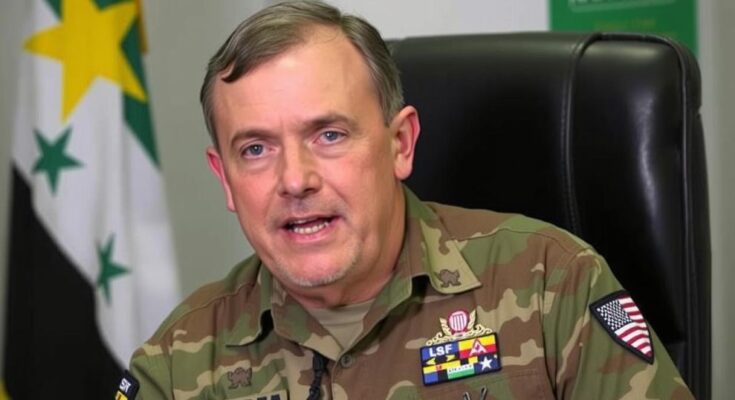General Mazloum Abdi, commander of the SDF, warned of a potential ISIS resurgence linked to sustained Turkish military attacks on Kurdish forces. Despite a ceasefire agreement, ongoing drone strikes and troop withdrawals jeopardize the security of ISIS detainees in Eastern Syria. The U.S. maintains limited military presence, emphasizing tactical cooperation with Kurdish allies as tensions rise.
In an interview with Fox News, General Mazloum Abdi, the commander of the Syrian Democratic Forces (SDF), expressed grave concerns regarding the ongoing attacks from the Turkish military, which have intensified despite a recent ceasefire. With Turkish assaults resulting in around eighty drone strikes and heavy artillery fire daily, General Mazloum warned that the stability of approximately 45,000 detained ISIS militants hangs in the balance. He indicated that a significant portion of his forces guarding these camps have been withdrawn, raising fears of an ISIS resurgence should they be compelled to retreat.
General Mazloum highlighted the precarious state of security around ISIS prisons. As half of his guards have been forced to leave to protect their families, the existing guard presence at facilities such as the Raqqa prison is alarmingly insufficient. “All of the prisons still are under our control. However, the prisons and camps are in a critical situation because who is guarding them? They are leaving and having to protect their families,” he stated. The U.S. maintains about 900 troops in the region, and their withdrawal could create a power vacuum that ISIS would exploit to re-establish itself.
National Security Communications Adviser John Kirby reassured that the U.S. aims to support its allies, stating, “We don’t want to see that happen. So we’re in very close touch with our SDF partners to try to maintain that focus on counter-ISIS missions.” Meanwhile, Secretary of State Antony Blinken met with Turkish President Recep Erdogan to discuss maintaining stability in Syria. It is imperative that human rights and the protection of minorities be upheld, according to U.S. diplomatic efforts.
General Mazloum also voiced concerns over the potential for a bloody civil war erupting, should the new Syrian government fail to include diverse groups, particularly Syrian Kurds. He emphasized the necessity for an inclusive government to prevent extremist forces from gaining ground. The situation remains critical, and the international community must remain vigilant to prevent further destabilization.
The ongoing conflict in Syria, particularly involving the Kurdish forces aligned with the U.S., is complicated by external military pressures, primarily from Turkey. With Turkey viewing the Kurdish fighters as a terrorist threat, their military actions have escalated following a recent U.S.-brokered ceasefire. The Kurdish SDF plays a significant role in detaining ISIS militants, thereby directly influencing the international fight against the extremist group. The geopolitical dynamics between the U.S., Turkey, and the Kurdish forces continue to evolve as the balance of power shifts in the region.
In summary, the situation in Syria poses a severe risk of ISIS resurgence due to increased Turkish military pressure on the Kurdish-led SDF. The withdrawal of Kurdish forces from guarding ISIS camps could create a vacuum that extremist elements might exploit. As diplomatic efforts intensify, the necessity for an inclusive Syrian government represents a crucial factor in maintaining stability and preventing further conflict. The international community must support its allies to thwart the re-emergence of ISIS and curb escalating tensions.
Original Source: www.foxnews.com




